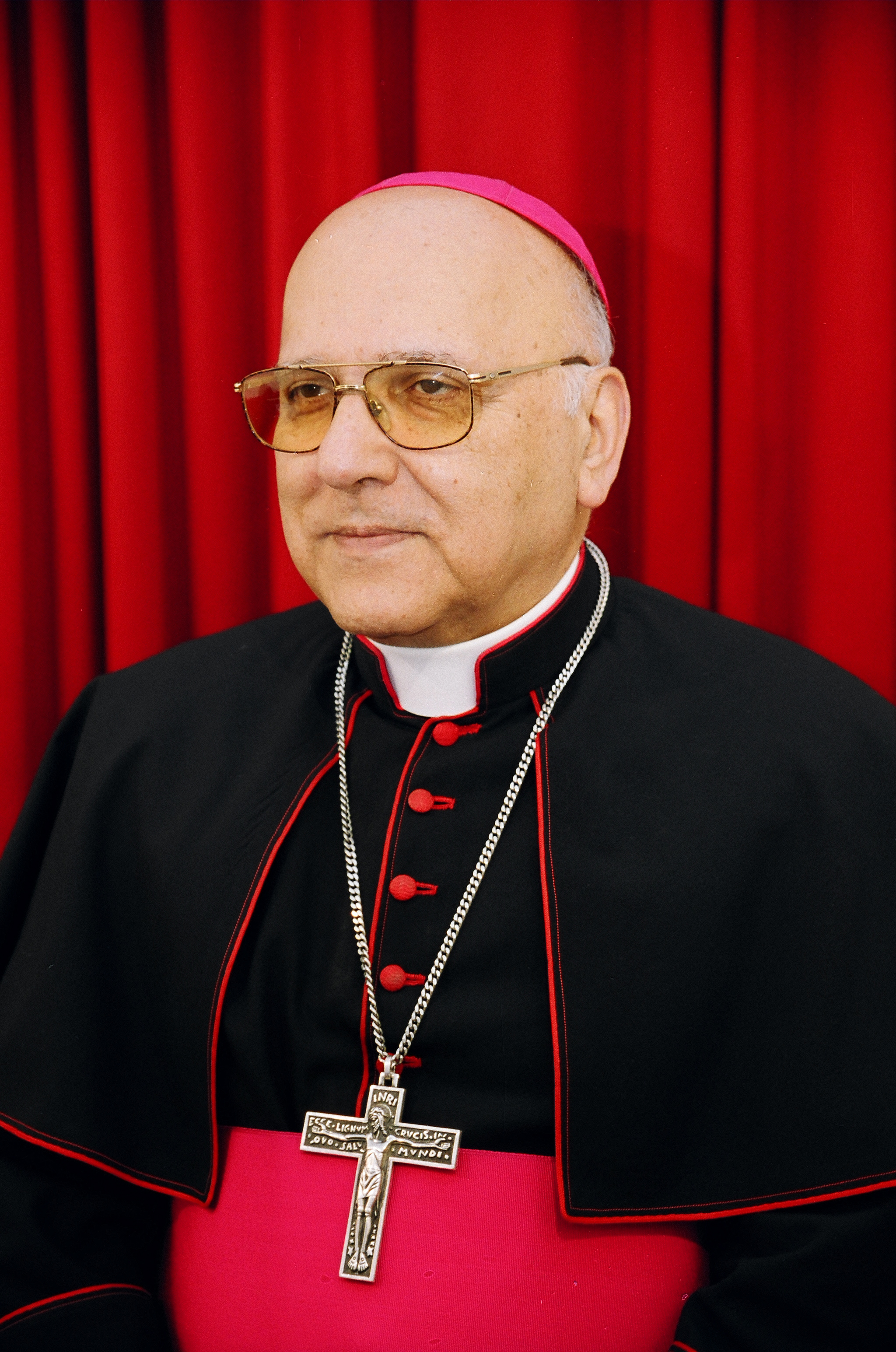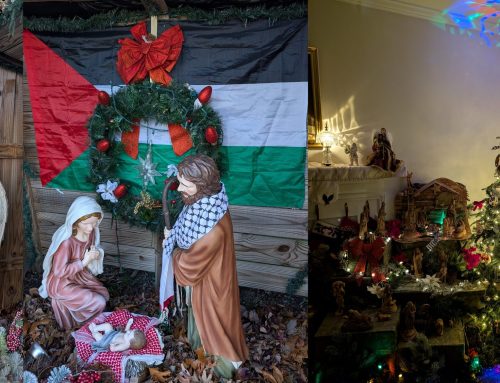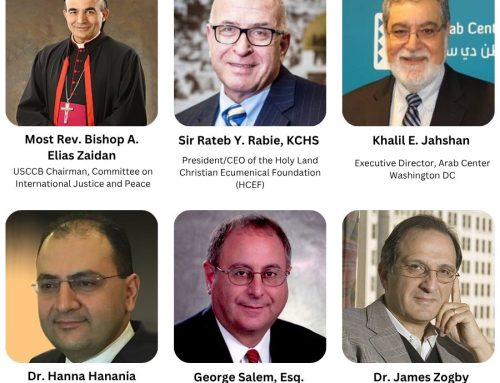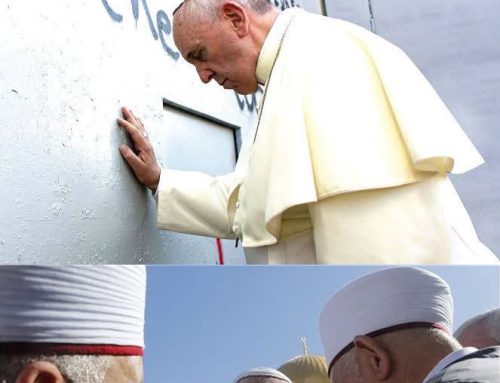H.B. Msgr. Michel Sabbah
as per interview with Saliba Sarsar*
Christianity is founded on the cross, and the cross is the basis of life for every Christian around the world. The meaning of the cross is given in the Holy Bible, “For God so loved the world, that he gave his only begotten Son, that whosoever believeth in him should not perish, but have everlasting life” (John 3:16).
The cross makes every person stronger than any evil, the evil within oneself and in the world. The cross in every individual’s private life is the symbol, the guide … because life is all crosses, and life is for the person to carry crosses and agrees to do so, thus turning the cross into joy and happiness.
As Jesus said, “Take up your cross, and follow me” (Matthew 16:24). He also said, whoever follows me, “my yoke is easy and my burden is light” (Matthew 11:30). Each heavy burden becomes light if the individual realizes the meaning of the cross and dedicates oneself to God first of all and accepts everything from God’s hand. Whatever happens in life, happens by God’s will.
There are things we understand and others we do not understand: pain, suffering, individual or national problems…. Why? We must pass through all of these crises. God has a plan or purpose. One day, the individual will discern it within oneself, within the history of nations, or even the history of humanity.
The cross itself leads to resurrection. Jesus died on the cross. However, He overcame death and rose from the dead. The cross is not an end, not a purpose, but the path to glory and the resurrection. That is, the Christian bearing the cross in life accepts and welcomes all the crises in one’s personal or national life for today and carries the cross, and within oneself and one’s heart the vision of glory that will come in this lifetime, not only in the hereafter….
The glory and the happiness come in different forms. The individual feels satisfied within oneself, and with a full understanding of one’s life as long as one is connected with God, connected to God’s love. Each individual life has no meaning unless it is connected to loving another person. In terms of the family, this is expressed in the love and dedication a husband and wife have for each other. The extent to which the individual is dedicated to the other brings a feeling of fulfillment and wholeness, and hence happiness.
Welcoming the cross and crises, and loving God, make the individual feel that life has meaning, even though there are many vague issues that are incomprehensible, which can cause for the unfaithful or the one who is unwelcoming God’s love, doubts, victimhood, complaints, and even weakening of the soul. All will disappear if the individual actually places oneself in the vision of love and giving. God gave us everything and we need to give Him everything. That is the meaning of loving God, and we receive everything from God’s hand.
That’s most important for understanding the meaning of the cross. The person ties one’s life to God and welcomes everything from God’s hand: happiness and sadness. Then, welcoming the cross means that the Christian works for life and for development, and becomes stronger with development.
In our current national crisis, for example, if the Palestinian Christian knows how to address the crisis as a Christian, he or she is able to present to the society new energy for resurrection, day of freedom, when every Palestinian becomes free from pain and oppression.
The cross is not solely a form of private worship or private faith isolated from others. The cross does not isolate the individual in society. Society is the creation of God and every individual in society, no matter who it is—Christian, Muslim, or Jewish; friend or foe—is connected to God’s love.
The Christian with this vision becomes stronger for dealing with all aspects of life. The Christian builds for oneself an individual life, based on contentment and strength.
What we often witness in the lives of Christians in the Holy Land is the reality under oppression and complexity of life dealing with the other—be it a neighbor or colleague, member of the congregation, fellow citizen, or one who does not believe in the same religion…. The Christian in relating to every other individual finds the image of God in every face, and hence can build with greater energy….
While this might be a natural human reaction, the Christian must go beyond crying and complaining so as to build and feel responsible for building. No one else is going to build for you or me….
The cross is … if I am a real Christian in my vision and understanding of my faith, and in my behavior, both reasonable and truthful.
*His Beatitude Monsignor Michel Sabbah is the Latin Patriarch Emeritus of Jerusalem and served as Patriarch from 1988 to 2008. In an interview with Saliba Sarsar in July 2003, he spoke of the meaning of the Cross in Christian Life. The tape was misplaced and only found recently, but its message is as relevant now as then. Below is its essence, as transcribed and translated from Arabic by Saliba. For more on Patriarch Sabbah’s religious and spiritual observations, see Patriarch Michel Sabbah, Faithful Witness, On Reconciliation and Peace in the Holy Land. Drew Christiansen and Saliba Sarsar, eds. Hyde Park, NY: New City Press, 2009; “Patriarch Michel Sabbah – Witness,” interview with Fr. Thomas Rosica, uploaded on Jul 4, 2011, https://www.youtube.com/watch?v=whJJan4eYto; and H.B. Michel Sabbah, Latin Patriarch Emeritus of Jerusalem, “Christians in Israel and in the Middle East,” address delivered at the academic congress “New Trends of Research on Palestinian Christian Identity in Israel,” Harry S. Truman Institute, Hebrew University of Jerusalem, on January 20, 2015, ZENIT News Agency, https://www.paxchristi.net/news/hb-michel-sabbah-latin-patriarch-emeritus-jerusalem-christians-israel-and-middle-east/4153#sthash.11nSkYzy.dpuf.
Saliba Sarsar is an HCEF volunteer and Professor of Political Science at Monmouth University.






